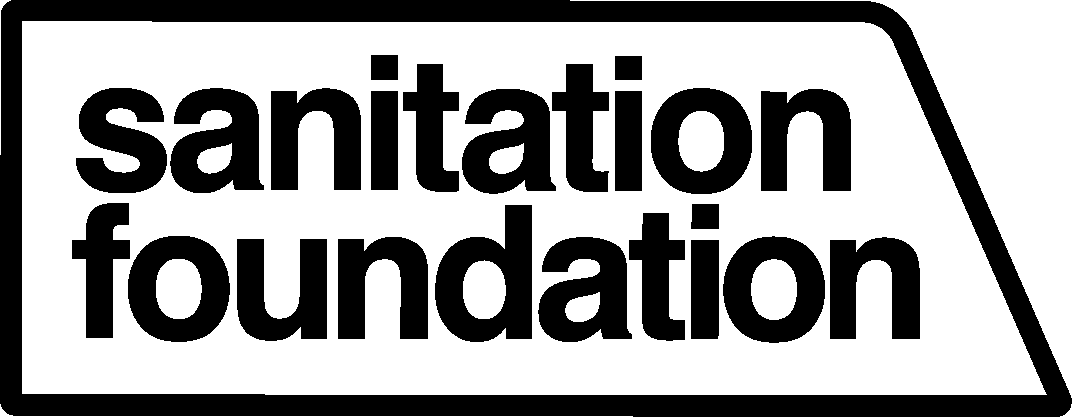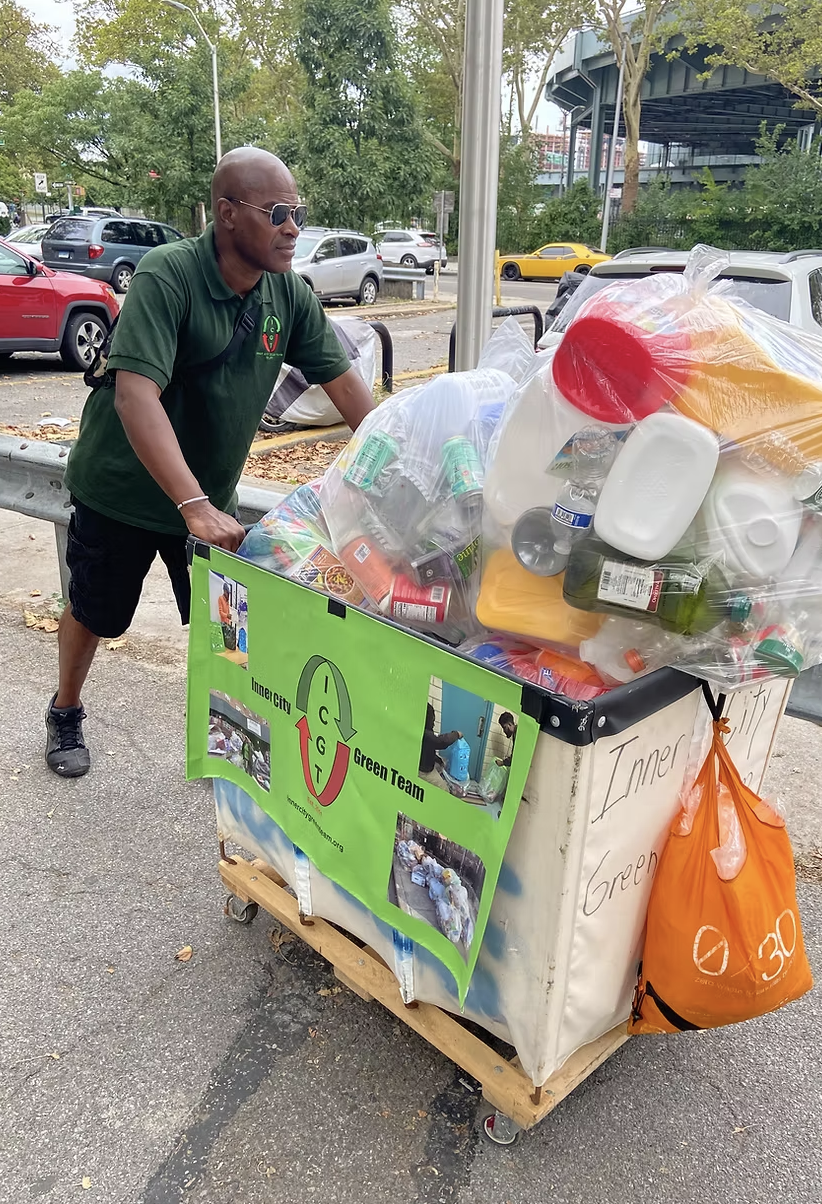Clean City Champion: Brigitte Charlton-Vicenty, founder of Inner City Green Team
We are honored to feature the work of Clean City Champion Brigitte Charlton-Vicenty, the visionary and tireless founder of the New York City Housing Authority (NYCHA)-based recycling initiative Inner City Green Team (ICGT).
By Anne Whiting
Brigitte Charlton-Vicenty has dedicated her life to helping NYCHA residents participate in keeping their homes, neighborhoods, and city-at-large clean through active cleanup and recycling programs. Her workforce development program trains and hires residents to engage their fellow neighbors while participating in waste management at a grassroots level. Not only does it help keep New York and NYCHA clean, but it keeps New Yorkers engaged and employed. When fully expanded, ICGT’s waste and recycling programs are designed to create hundreds of living-wage jobs.
What incited you to take action on a larger scale—and how did you first get started?
My green ministry was born out of frustration with the lack of an easy and accessible way for my community to recycle. Fourteen years ago, ICGT was ahead of its time with words like "environmental justice” and “waste equity.” I visualized my Right to Recycle Collection Initiative to address the lack of convenient recycling; I was compelled to think of a better solution, and my literal soul was ignited to uncover the truth as to why the largest landlord in public housing was disposing of recyclables as trash.
“Fourteen years ago, ICGT was ahead of its time with words like "environmental justice” and “waste equity.” I visualized my Right to Recycle Collection Initiative to address the lack of convenient recycling; I was compelled to think of a better solution.”
Residential recycling became law in NYC over 35 years ago. But it’s still not very active in the city’s affordable housing campuses. These campuses have long been considered difficult places to achieve proper recycling because of their density and limited space. Check out NYCHA’s recent Progress Report for more information. Yet: 1 in 17 New Yorkers reside in NYC public housing communities, but do not have access to NYC programs to recycle their recyclable materials, electronics, textiles, or food scraps.
These communities have some of the highest unemployment rates and are in critical need of jobs—56% of all working-age residents do not report income from employment. According to estimates, as many as 100,000 NYCHA residents are without jobs. Our workforce development program trains and hires residents to engage their fellow residents. When fully expanded, our program can create hundreds of living-wage jobs.
Fueled by a deep desire to uncover the truth [about why there was no recycling participation], I felt compelled to create a better solution. My mission is personal—rooted in the experience of being part of a disenfranchised group that the mainstream environmental community has overlooked for decades.
I have dedicated most of my life to serving my community, driven by my neighbors' trust in me to find solutions.
“I am committed to leading the charge to challenge these injustices and break the stereotype that POC in marginalized communities are uninterested in recycling, climate change, and environmental justice.”
What are some of your most memorable moments directing ICGT?
There’s too many to mention, but here’s a few:
Winning the NYCx Co-Lab Challenge to pilot our recycling initiative at the Brownsville Houses in Brooklyn
Being awarded my first fellowship from Echoing Green
Expanding operations to the Wagner Houses in East Harlem
Partnering with Precious Plastics NYC and Mika Rottenberg Studios (Check out the video here!)
Expanding our collection to include textiles and organic waste
Purchasing our first work vehicle
How do you see this “green ministry” helping your community since you started?
Our Recycle Right Collection Initiative provides a free, at-your-door recycling collection service every Friday, all year round. We also conduct outreach events to promote proper recycling practices and increase engagement and enrollment. Our “service delivery” approach provides residents with the most convenient, accessible, and engaging recycling experience.
Our Re-Use-A-Palooza-Thon reduces textile waste by collecting, recycling, and donating gently used clothing and textiles. By accepting donations of unwanted clothes, shoes, and other fabric-based products, the organization focuses on diverting these materials from landfills, promoting environmental sustainability, and encouraging circular economy practices. This textile collection program has received an incredible response and participation.
The Food Recycling Pilot supplies free in-home food pre-composters [machines that dehydrate and partially decompose organic materials] to expand our “ease-of-use” concept. This accessible technology empowers residents to take ownership of the food waste they generate, sustainably. The costs for the appliances are covered through grant funding and in-kind donations to purchase the appliances at cost.
For food, there’s also Rescuing Leftover Cuisine—a food rescue volunteer program with Rescuing Leftover Cuisine, Inc., through which we’ve distributed 510 meals and prevented the release of 1,425.96 pounds of CO2 emissions. More funding would help supplement the cost of travel to collect the food and distribute it to residents.
Lastly, Plastic Bottle Waste Reduction: to encourage reduced plastic water bottle purchases, we allocate some of our funding to provide in-home ZeroWater filtration systems from Culligan to reward participating residents.
1 in 17 New Yorkers reside in NYC public housing communities, but do not have great access to NYC programs to recycle their recyclable materials, electronics, textiles, or food scraps.
How do you go about inspiring your neighbors to partake in recycling and more?
Being a constant presence on campus has been an exponential strategy to increase resident participation. Biannually, our outreach team conducts door-knocking at every unit to encourage enrollment in the program.
Our current outreach goal is to launch a Resident Environmental Action Leaders (REAL) program on every campus, establishing a community-wide responsibility that builds behavioral change to reduce waste generationally. REAL is a training initiative to recruit residents to be community recycling experts, conducting outreach to develop long-term recycling habits. One barrier to that goal is the lack of capacity to build operations, and funding to implement outreach plans and train residents.
What can New Yorkers do to help your cause?
Citizens can offer financial support via PayPal. Donations are tax deductible!
There are also many opportunities for the City to build a dedicated partnership with ICGT. The City can start with reintroducing Local Law 49-2017, which suggested that DSNY should consult with NYCHA to study and consider implementing a pilot incentives program to increase recycling rates. The law states: "If the department concludes that such a program is feasible and would increase recycling rates, it must implement such a program by 2020 and report on its effectiveness and whether it should be made permanent after two years." Eight years later, the law remains inactive.
Check out the Inner City Green Team website for more ways to get involved!






